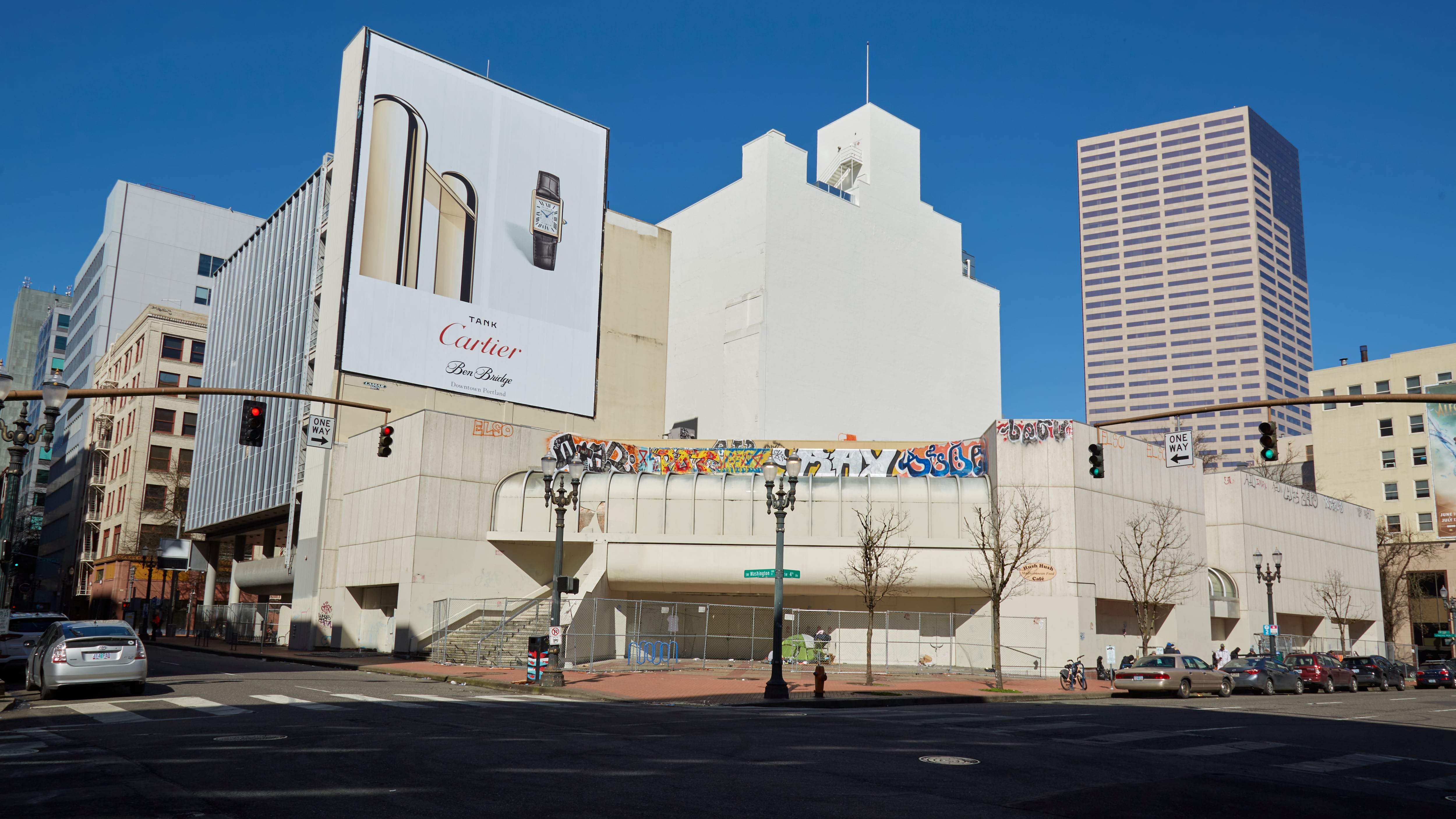In his company biography, Barry Menashe, founder of one of the city’s wealthiest property clans, says he has a “sixth sense” about Portland real estate. “Making lightning-fast decisions comes very naturally.” And he’s “passionate about keeping spaces pin-straight.”
There’s nothing “pin-straight” about a building that Menashe owns at Southwest 4th Avenue and Washington Street. Washington Center, as it’s called, might be among the most blighted properties in downtown Portland.
Once the site of a KeyBank branch, a bagel shop, a bridal store, and a business school, the complex is vacant now, save for drug-addled denizens who’ve stepped in through a broken window. Where tellers once cashed checks and made change, loiterers now hide from the light. The safe is covered in graffiti. A dead rat lay in state in the middle of the lobby.
Menashe Properties, which bought Washington Center for $9 million in 2014 through two limited liability companies, owns office buildings all over the Portland area and in Dallas, Denver and Seattle, where tenants are likely to be lawyers, accountants and architects. At Washington Center, the Menashes’ occupants are drug dealers.
The current condition of the property has attracted Portland’s pop-up fentanyl market, previously located north of West Burnside Street, to a main artery of the city—one that visitors see as they cross into downtown over the Morrison Bridge.
Other business owners and city officials are perplexed by how the Menashe family has let a property at the heart of the city disintegrate.
“It’s the skid row of Portland,” says an employee at a nearby business who declined to be named for fear that drug gangs might target her. “I have to walk through all these dealers daily at all hours of the day and night. My goal is not to die in this city. Literally.”
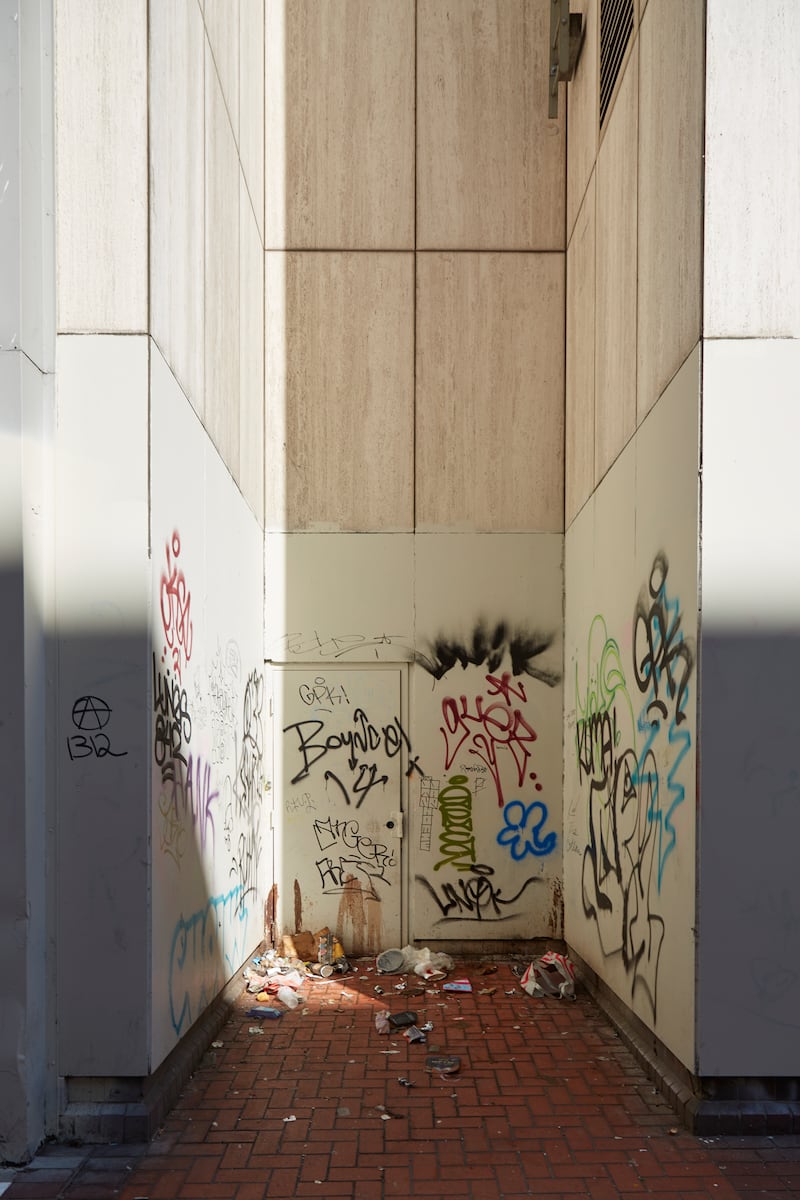
The Menashes owe tens of thousands of dollars to the Downtown Portland Clean & Safe District, the chunk of downtown where property owners pay extra for security and cleaning services, according to a person familiar with the situation.
Lauren Menashe, Barry’s daughter, agreed to answer questions by email. Her family’s firm planned to sell the building to a developer, but COVID-19 and Portland’s inclusionary zoning policies scared off buyers, she says. Measure 110, which decriminalized the personal possession of some hard drugs, was “another dagger.”
As for the Clean & Safe dues, Menashe says: “We will be more than happy to pay when the city is clean and crime is properly attended to. We have asked repeatedly to meet with Clean & Safe to discuss their plans. We continue to be unsuccessful in receiving a response.”
The Clean & Safe District says it’s ready and willing.
“We always welcome the opportunity to meet with downtown stakeholders when they request a meeting,” says Clean & Safe executive director Mark Wells. Indeed, Wells contends that Clean & Safe provided City Hall and the Menashes a plan to secure the property last July, then held a daylong cleanup.
The contractual operator of the district, the Portland Business Alliance, says downtown’s best days are ahead. “But to get there we need to be honest that our central city has significant challenges,” says PBA president Andrew Hoan. “To get downtown back on track, we need everyone with a stake to do their part to overcome these challenges.”
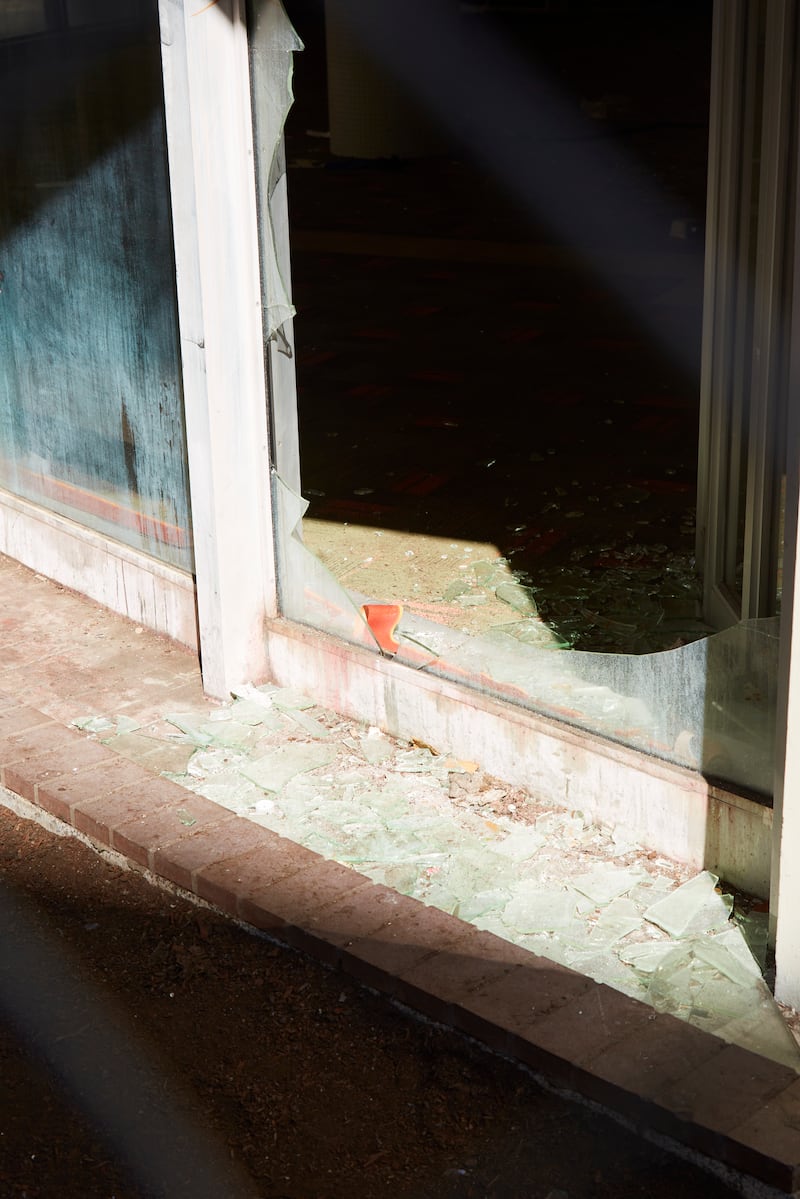
Barry Menashe, 69, has had a long, rocky relationship with the city of Portland. He started his real estate career while still a senior at the University of Oregon.
“I was selling shoes and didn’t know what I was going to do when I graduated,” he said in a 2006 interview with the Daily Journal of Commerce. “I was 21 years old, a senior at the University of Oregon, when I got my real estate license. I was very motivated, just to win, and to make money. Everybody started calling me because I was like the wonder boy.”
Menashe is given to bravado. In the first two minutes of the DJC interview, he pulled out an album full of newspaper clippings, reporter Kennedy Smith wrote.
“I was never a huge brain in school,” Menashe told Smith. “I got good grades, but I’m not greatly book smart. I’m very savvy to the street and what’s going on around me. My fast thinking and fast moving gives me the advantage over other people who can’t move fast.”
At the time of that interview, Menashe was a full-on mogul, plunking down millions for buildings at high speed. In 2010, though, he got in a pissing match with the city and refused to pay past-due fees of $50,400 to Clean & Safe, telling The Oregonian that “downtown Portland is not clean or safe. I plant flowers, and people just steal my flowers.”
Menashe had a change of heart in 2016. Shortly after Mayor Charlie Hales declared a housing emergency, Menashe donated part of Washington Center to use as a homeless shelter. Menashe had a personal connection, The Oregonian reported at the time. Two of his four siblings suffered mental illness and spent time on the streets before dying in their 50s.
Relations with the city soured again thereafter. In May 2021, Menashe offered Mayor Ted Wheeler $5 million to help clean up the city if a deal could be reached in three days, the Portland Business Journal reported. Wheeler acknowledged the offer in a text and said he’d “reach out,” the PBJ reported. When Menashe didn’t hear anything for five days, he scrapped the donation.
His son, Jordan, moved to Dallas shortly after complaining to the Portland Business Journal about seeing hypodermic needles and human excrement outside Washington Center. Barry Menashe has stuck around Portland. He lives in Dunthorpe.
Meanwhile, Washington Center is festering. The chain-link fence that surrounds it is in pieces, with sections flattened to the sidewalk. Trash is piled along the exterior, where people strung out on fentanyl slump against a low brick wall. Dealers sell pills from an alcove on the south side.
David Baer, public information officer for the Portland Police Bureau’s Central Precinct Neighborhood Response Bike Squad, says the building is his group’s top priority right now.
“The fentanyl dealing in that area is rampant and, unfortunately, brings violence to the area,” Baer says in an email. “We have taken several guns off folks there and arrested one dealer for attempted murder after investigators identified him as a shooting suspect.”
Baer warns people not to go into the old KeyBank. “It’s fairly hazardous in the building due to extensive mold, human waste and some amateur demolition,” he says.
Eric Zimmerman, an adviser to Mayor Wheeler on cleaning up downtown, says the area around the building is the most problematic in the central city. “The corner of 4th and Washington is something we talk about every day,” he says.
Zimmerman says things are looking up, cooperationwise. “The owners are talking to the mayor’s office, and we appreciate that,” he says.
Federal and local laws require property owners to maintain sidewalks that border their buildings. The Portland Business Alliance asked lawyers at Miller Nash LLP to prepare a memo for downtown property owners on their responsibilities.
“The Americans with Disabilities Act (ADA) and City of Portland Code require property owners to take certain actions to maintain abutting sidewalks,” the September memo said. “This can include removing refuse, tents, and other items that hinder accessibility and create unsafe conditions.”
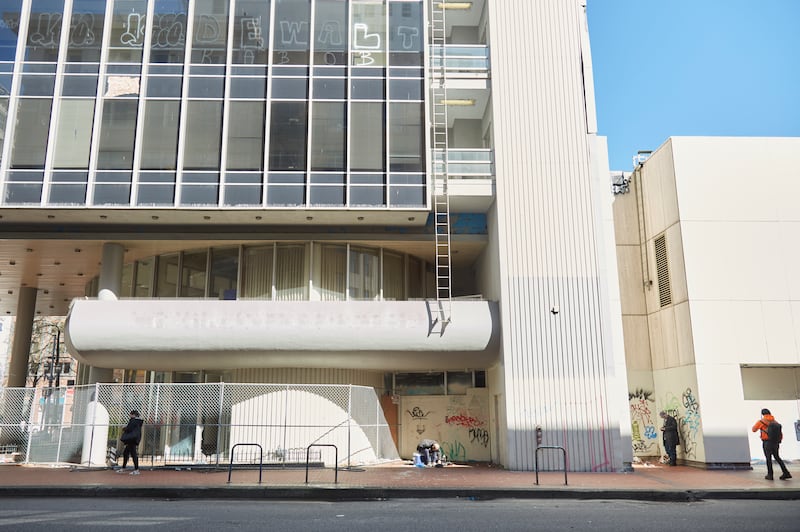
The fight over Washington Center is growing fiercer. The Portland Bureau of Development Services visited on March 8 and 10, according to city records, and opened four cases for broken windows and for the piles of broken glass, metal debris, raw food and feces.
BDS gave the Menashes 15 days to comply with city code. Inspectors will return March 25, and if the mess persists, spokesman Ken Ray says, the agency will notify the Menashes that it plans to hire a contractor to clean it up. BDS would place a lien on the property to cover costs.
“The property owner ultimately pays for that work,” Ray says.
Lauren Menashe says the city is to blame.
“Lawlessness is the only word I can come up with to describe this once beautiful and thriving area of downtown,” she says. “Despite our best efforts to maintain the site and any form of order or cleanliness, including boarding up the property and broken windows daily, hiring private security, paying for fencing, weekly outreach to police and city officials, it has proven impossible to keep any and all forms of transients, criminal activity, vandalism and destruction away from this site. Simply put, the condition of this property is a product of shortsighted legislation and has been handcuffed by unmanageable circumstances.”
One caveat: “The police have been an exceptional resource to us. Sadly, their good work only goes so far,” Menashe adds. “If our county is unable or unwilling to prosecute, back on the streets the criminals go.”
And into the old KeyBank, too.
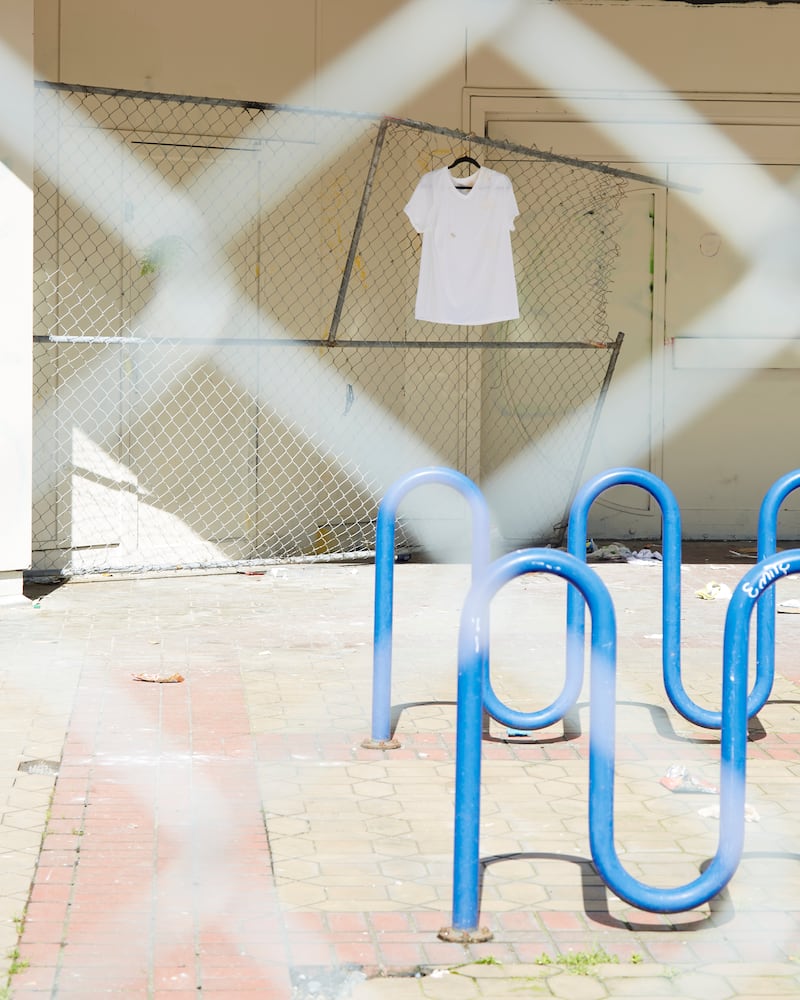
ADDRESSES: 444 SW 5th Ave., 401-419 SW Washington St., 423-437 SW 4th Ave.
YEARS BUILT: 1965, 1977, NA
SQUARE FOOTAGE: 37,970, 33,961, NA
MARKET VALUES: $2.5 million, $3.7 million, $1.26 million
OWNERS: Fifth Avenue LLC, Fourth Avenue LLC, Fourth Avenue LLC, respectively
HOW LONG IT’S BEEN EMPTY: KeyBank moved out in 2018.
WHY IT’S EMPTY: Tenants moved out as blight moved in.
Every week, WW examines one mysteriously vacant property in the city of Portland, explains why it’s empty, and considers what might arrive there next. Send addresses to newstips@wweek.com.
